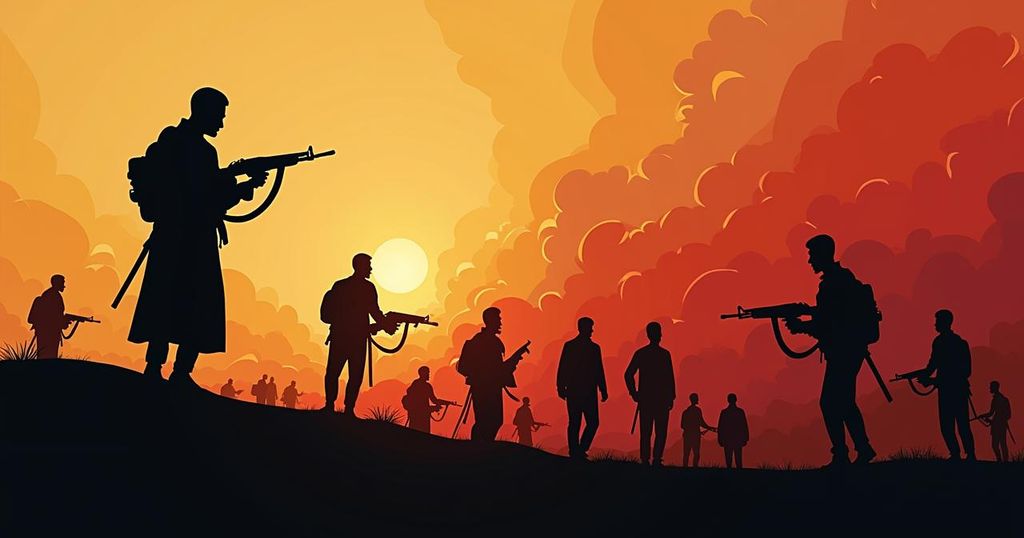Implications of Hassan Nasrallah’s Assassination: What Lies Ahead for Hezbollah, Iran, and Israel?
The assassination of Hezbollah leader Hassan Nasrallah by Israel has significantly escalated tensions in the region, raising concerns of a wider conflict involving Iran and the United States. Hezbollah, although weakened, seeks revenge while Iran may mobilize its allied militias. Israel intends to continue its military campaign to neutralize the threat posed by Hezbollah, potentially leading to a ground invasion of Lebanon.
The assassination of Hassan Nasrallah, the influential leader of Hezbollah, by Israeli forces marks a significant escalation in the ongoing conflict between Israel and the Lebanese militant group. This development raises concerns regarding the potential for a broader and more destructive conflict involving both Iran and the United States. The future course of action by Hezbollah, Iran, and Israel will depend on several critical factors. Hezbollah finds itself in a precarious position following the death of Nasrallah. The group has suffered substantial losses, including the elimination of over a dozen senior commanders, disruptions to its communication systems, and damage to its arsenal from air strikes. Despite these setbacks, there is a prevailing sentiment among Hezbollah members, particularly those who have recently returned from combat in Syria, that they must seek revenge. Their military capability, still bolstered by thousands of fighters and a significant stockpile of long-range missiles, positions them to potentially retaliate against Israel. However, any mass attack against Israel could invite severe retaliation that may devastate Lebanon’s infrastructure and could extend the conflict to involve Iran. On the Iranian front, the assassination of Nasrallah represents a profound loss, provoking a period of national mourning and security precautions for its leadership. This incident may embolden hardliners within Iran to consider a retaliatory response, especially given their network of allied militias throughout the Middle East—collectively known as the “Axis of Resistance.” Iran’s options for retaliation likely encompass mobilizing these groups to launch attacks on both Israel and American interests in the region, albeit with caution to avoid a full-scale war. For Israel, the assassination underscores the determination to continue its military campaign without regard for the ceasefire proposed by the international community. With Hezbollah on the defensive, Israel aims to maintain the pressure until the perceived missile threat is neutralized. Achieving this goal, however, may necessitate a ground invasion of Lebanon. Historical insights suggest that while initiating an incursion may be feasible, the subsequent withdrawal could be fraught with challenges, much like previous endeavors in Gaza. In summary, the geopolitical landscape in the region is fraught with tension following the killing of Hassan Nasrallah, with significant implications for Hezbollah, Iran, and Israel. As each player assesses their next move, the potential for a wider conflict looms, reflecting a complex interplay of power dynamics and military strategy.
The article discusses recent developments in the escalating conflict between Israel and Hezbollah following the assassination of Hassan Nasrallah. This event not only affects Hezbollah but also involves Iran, a key ally of the group, raising concerns about broader regional instability. The analysis explores the implications for Hezbollah’s operational capabilities, Iran’s response options, and Israel’s military strategy moving forward.
In conclusion, the killing of Hassan Nasrallah by Israeli forces is a pivotal event that could fundamentally alter the dynamics of the conflict in the region. Hezbollah is likely to seek revenge despite suffering significant losses, while Iran may mobilize allied militias to respond strategically within the broader context of its regional ambitions. Israel’s military strategy will likely intensify as it seeks to neutralize the threat posed by Hezbollah. This situation is ripe for escalation, and the actions taken by these parties in the coming days will be critical in shaping the future stability of the region.
Original Source: www.bbc.com




Post Comment